最新一般将来时(完整版)
- 格式:doc
- 大小:63.50 KB
- 文档页数:8
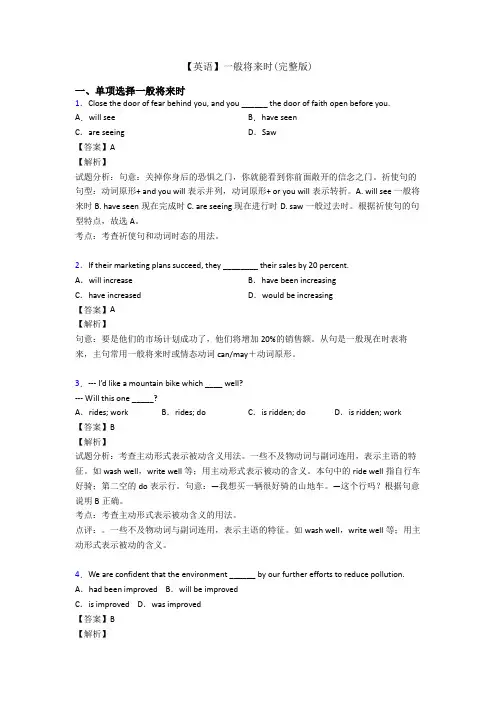
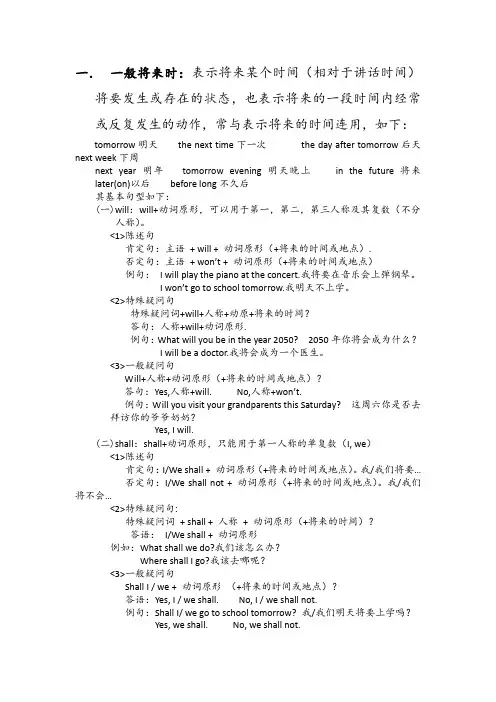
一.一般将来时:表示将来某个时间(相对于讲话时间)将要发生或存在的状态,也表示将来的一段时间内经常或反复发生的动作,常与表示将来的时间连用,如下:tomorrow明天the next time下一次the day after tomorrow后天next week下周next year明年tomorrow evening明天晚上in the future将来later(on)以后before long不久后其基本句型如下:(一)will:will+动词原形,可以用于第一,第二,第三人称及其复数(不分人称)。
<1>陈述句肯定句:主语+ will + 动词原形(+将来的时间或地点).否定句:主语+ won’t + 动词原形(+将来的时间或地点)例句:I will play the piano at the concert.我将要在音乐会上弹钢琴。
I won’t go to school tomorrow.我明天不上学。
<2>特殊疑问句特殊疑问词+will+人称+动原+将来的时间?答句:人称+will+动词原形.例句:What will you be in the year 2050? 2050年你将会成为什么?I will be a doctor.我将会成为一个医生。
<3>一般疑问句Will+人称+动词原形(+将来的时间或地点)?答句:Yes,人称+will. No,人称+won’t.例句:Will you visit your grandparents this Saturday? 这周六你是否去拜访你的爷爷奶奶?Yes, I will.(二)shall:shall+动词原形,只能用于第一人称的单复数(I, we)<1>陈述句肯定句:I/We shall + 动词原形(+将来的时间或地点)。
我/我们将要…否定句:I/We shall not + 动词原形(+将来的时间或地点)。
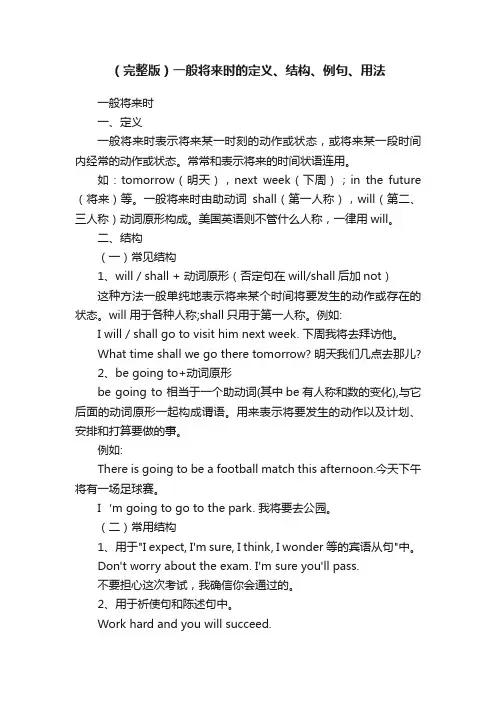
(完整版)一般将来时的定义、结构、例句、用法一般将来时一、定义一般将来时表示将来某一时刻的动作或状态,或将来某一段时间内经常的动作或状态。
常常和表示将来的时间状语连用。
如:tomorrow(明天),next week(下周);in the future (将来)等。
一般将来时由助动词shall(第一人称),will(第二、三人称)动词原形构成。
美国英语则不管什么人称,一律用will。
二、结构(一)常见结构1、will / shall + 动词原形(否定句在will/shall后加not)这种方法一般单纯地表示将来某个时间将要发生的动作或存在的状态。
will用于各种人称;shall只用于第一人称。
例如:I will / shall go to visit him next week. 下周我将去拜访他。
What time shall we go there tomorrow? 明天我们几点去那儿?2、be going to+动词原形be going to 相当于一个助动词(其中be有人称和数的变化),与它后面的动词原形一起构成谓语。
用来表示将要发生的动作以及计划、安排和打算要做的事。
例如:There is going to be a football match this afternoon.今天下午将有一场足球赛。
I‘m going to go to the park. 我将要去公园。
(二)常用结构1、用于"I expect, I'm sure, I think, I wonder等的宾语从句"中。
Don't worry about the exam. I'm sure you'll pass.不要担心这次考试,我确信你会通过的。
2、用于祈使句和陈述句中。
Work hard and you will succeed.如果你努力,就会成功的。
3、与表示时间或条件的状语从句连用。

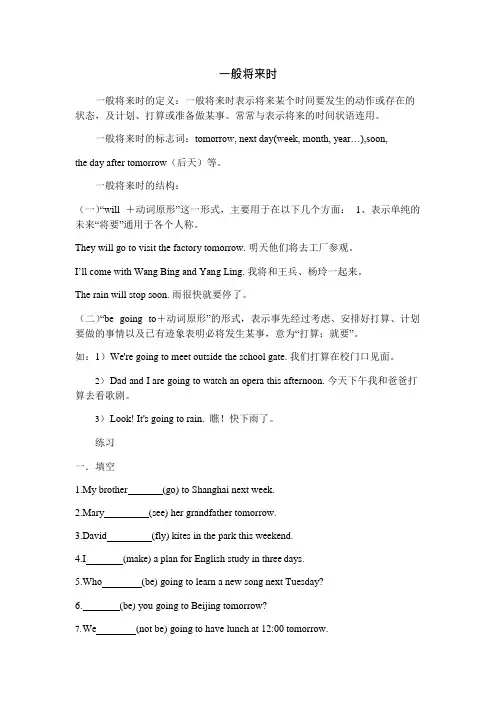
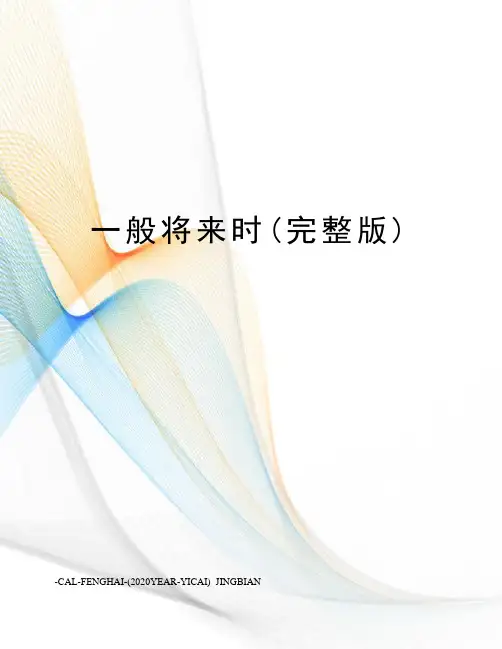
一般将来时(完整版) -CAL-FENGHAI-(2020YEAR-YICAI)_JINGBIAN一般将来时(完整版)一、单项选择一般将来时1.---I don’t know when _____ tomorrow.---I will call you as soon as he_____.A.will he come; arrives B.he will come; arrivesC.he will come; will arrive D.will he come; will come【答案】B【解析】考查时态。
第一句为when 引导的宾语从句,从句的时态,要根据时态本身来决定,第二句为if 引导的条件状语,主句为一般将来时,从句要用一般现在时,代替将来时,故选答案为B2.China's present environment situation is from bad to worse and if we _________ now to protect the environment, we’ll live to regret it.A.hadn’t acted B.haven’t acted C.don’t act D.won’t act【答案】C【解析】试题分析:句意:中国目前的环境状况越来越糟糕,如果我们现在不采取行动来保护环境,我们将会后悔。
if引导的条件状语从句,主句为一般将来时态,if从句用一般现在时态,选C。
考点:考查时态3. - Will you be available at three o'clock tomorrow afternoon?- No. I ______ a lecture then.A.are attending B.will have attended C.will attend D.will be attending 【答案】D【解析】试题分析:考查动词时态。
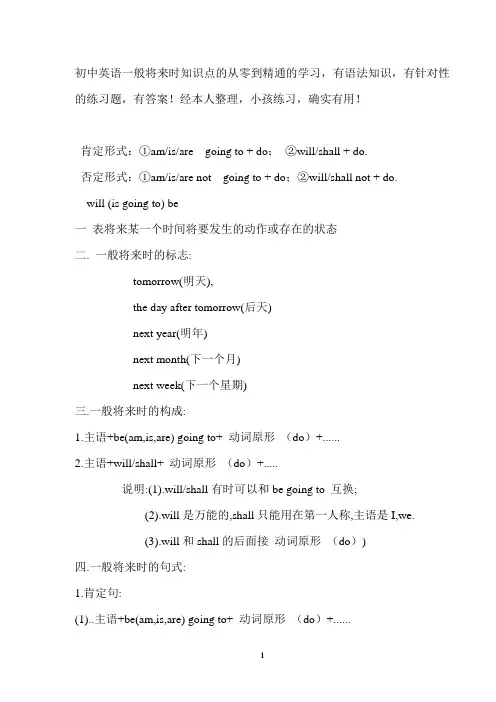
初中英语一般将来时知识点的从零到精通的学习,有语法知识,有针对性的练习题,有答案!经本人整理,小孩练习,确实有用!肯定形式:①am/is/are going to + do;②will/shall + do.否定形式:①am/is/are not going to + do;②will/shall not + do.will (is going to) be一表将来某一个时间将要发生的动作或存在的状态二. 一般将来时的标志:tomorrow(明天),the day after tomorrow(后天)next year(明年)next month(下一个月)next week(下一个星期)三.一般将来时的构成:1.主语+be(am,is,are) going to+ 动词原形(do)+......2.主语+will/shall+ 动词原形(do)+.....说明:(1).will/shall有时可以和be going to 互换;(2).will是万能的,shall只能用在第一人称,主语是I,we.(3).will和shall的后面接动词原形(do))四.一般将来时的句式:1.肯定句:(1)..主语+be(am,is,are) going to+ 动词原形(do)+......(2)..主语+will/shall+ 动词原形(do)+.....2.否定句:(1)..主语+be(am,is,are) not going to+ 动词原形(do)+......(2)..主语+will/shall not+ 动词原形(do)+.....3.一般疑问句:(1).Am/Is,Are+主语+going to+ 动词原形(do)+....(2).Will//shall+主语+ 动词原形(do)+...4.特殊疑问句:(1).What (Where, How...)+be (am,is,are)+主语+ going to + 动词原形(do)+...?(2). What (When,Where,How...) +will/shall+ 主语+ 动词原形(do)+...?二、基本结构:①be going to + do;②will+ do.三、否定句:在be动词(am, is, are)后加not或will后加not成won’t。
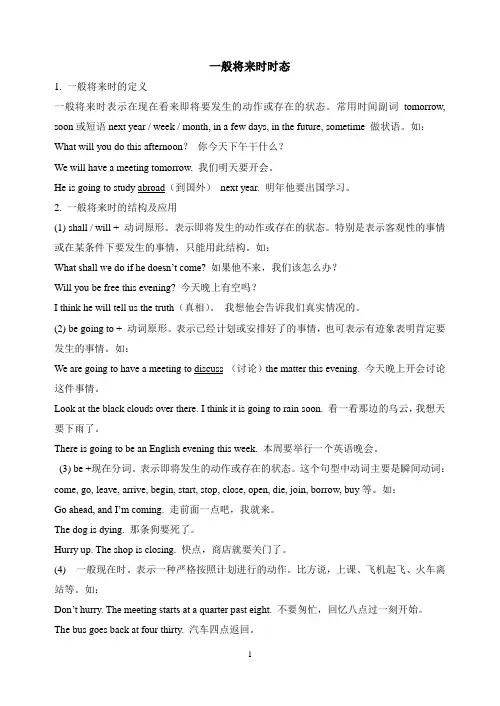
一般将来时时态1. 一般将来时的定义一般将来时表示在现在看来即将要发生的动作或存在的状态。
常用时间副词tomorrow, soon或短语next year / week / month, in a few days, in the future, sometime 做状语。
如:What will you do this afternoon?你今天下午干什么?We will have a meeting tomorrow. 我们明天要开会。
He is going to study abroad(到国外)next year. 明年他要出国学习。
2. 一般将来时的结构及应用(1) shall / will + 动词原形。
表示即将发生的动作或存在的状态。
特别是表示客观性的事情或在某条件下要发生的事情,只能用此结构。
如:What shall we do if he doesn’t come? 如果他不来,我们该怎么办?Will you be free this evening? 今天晚上有空吗?I think he will tell us the truth(真相)。
我想他会告诉我们真实情况的。
(2) be going to + 动词原形。
表示已经计划或安排好了的事情,也可表示有迹象表明肯定要发生的事情。
如:We are going to have a meeting to discuss (讨论)the matter this evening. 今天晚上开会讨论这件事情。
Look at the black clouds over there. I think it is going to rain soon. 看一看那边的乌云,我想天要下雨了。
There is going to be an English evening this week. 本周要举行一个英语晚会。
(3) be +现在分词。
表示即将发生的动作或存在的状态。
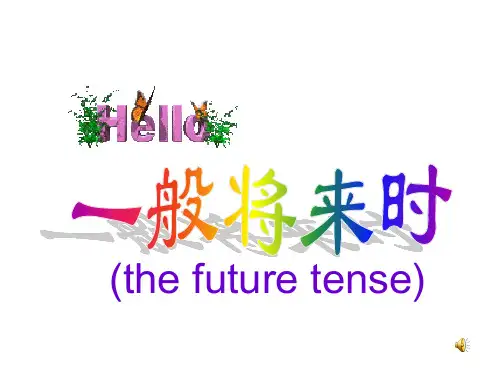
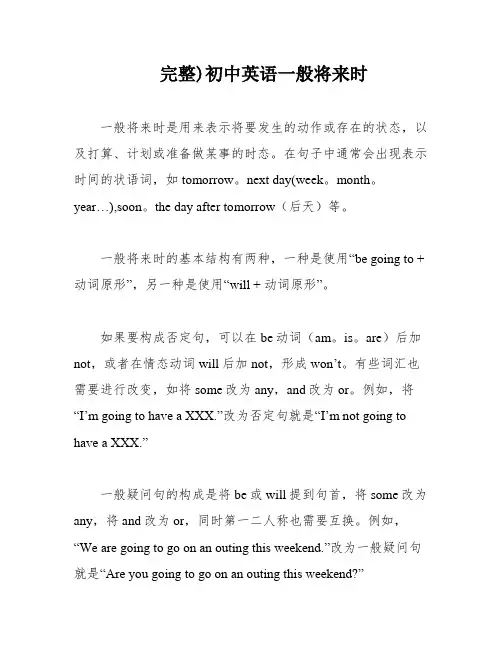
完整)初中英语一般将来时一般将来时是用来表示将要发生的动作或存在的状态,以及打算、计划或准备做某事的时态。
在句子中通常会出现表示时间的状语词,如tomorrow。
next day(week。
month。
year…),soon。
the day after tomorrow(后天)等。
一般将来时的基本结构有两种,一种是使用“be going to + 动词原形”,另一种是使用“will + 动词原形”。
如果要构成否定句,可以在be动词(am。
is。
are)后加not,或者在情态动词will后加not,形成won’t。
有些词汇也需要进行改变,如将some改为any,and改为or。
例如,将“I’m going to have a XXX.”改为否定句就是“I’m not going to have a XXX.”一般疑问句的构成是将be或will提到句首,将some改为any,将and改为or,同时第一二人称也需要互换。
例如,“We are going to go on an outing this weekend.”改为一般疑问句就是“Are you going to go on an outing this weekend?”对于划线部分的提问,一般将来时的对划线部分有三种情况。
第一种是问人,可以使用Who,例如“I’m going to New York soon.”改为问句就是“Who’s going to New York soon?”第二种是问干什么,可以使用What … do,例如“My father is going to watch a race with me this after noon.”改为问句就是“What is your father going to do with you this afternoon?”第三种是问什么时候,可以使用When,例如“She’s going to go to bed at nine.”改为问句就是“When is she going to bed?”同义句的构成是将be going to改为will,例如“I am going to go XXX.”可以改为“I will go XXX.”最基本的一般将来时结构是使用“will + 动词原形”,例如“XXX.”表示明天他们将要参观博物馆。

一.一般将来时:表示将来某个时间(相对于讲话时间)将要发生或存在的状态,也表示将来的一段时间内经常或反复发生的动作,常与表示将来的时间连用,如下:tomorrow 明天 the next time 下一次 the day after tomorrow 后天 next week 下周next year 明年tomorrow evening 明天晚上in the future将来later(on)以后before long 不久后其基本句型如下:( 一) will: will+原形,可以用于第一,第二,第三人称及其复数(不分人称)。
<1>述句肯定句:主 + will + 原形( +将来的或地点) . 否定句:主 +won’t+ 原形( +将来的或地点)例句: I will play the piano at the concert.我将要在音会上琴。
I won’tgo to school tomorrow.我明天不上学。
<2>特殊疑句特殊疑 +will+人称 +原 +将来的?答句:人称 +will+原形 .例句:What will you be in the year 2050? 2050 年你将会成什么?I will be a doctor.我将会成一个医生。
<3>一般疑句Will+ 人称 +原形( +将来的或地点)?答句: Yes,人称 +will.No,人称 +won’t.例句:Will you visit your grandparents this Saturday? 周六你是否去拜你的奶奶?Yes, I will.( 二) shall:shall+原形,只能用于第一人称的复数(I, we)<1>述句肯定句:I/We shall + 原形(+将来的或地点)。
我/ 我将要⋯否定句: I/We shall not +原形(+将来的或地点)。
我/我将不会⋯<2>特殊疑句 :特殊疑+ shall + 人称 + 原形( +将来的)?答: I/We shall + 原形例如: What shall we do?我怎么?Where shall I go?我去哪呢?<3>一般疑句Shall I / we + 原形(+将来的或地点)?答: Yes, I / we shall.No, I / we shall not.例句: Shall I/ we go to school tomorrow? 我/ 我明天将要上学?Yes, we shall.No, we shall not.( 三) be going to 结构,根据人称及单复数变换系动词be 的形式(am, is, are)。
最新高一英语一般将来时技巧和方法完整版及练习题一、单项选择一般将来时1.It's really time I went home but I'm enjoying myself, so I ________ here a bit longer.A.am staying B.have stayedC.stayed D.stay【答案】A【解析】句意:尽管我现在该回家了,但我现在玩得正高兴,因此再多呆会儿。
动词stay可以用进行时表示将来的动作,故选A项。
2. How happy we are!The winter holiday we have been looking forward ____soon.A.has come B.to have comeC.to coming D.to will come【答案】D【解析】【详解】考查时态。
句意:我们真开心啊!我们一直期待的寒假很快就要来了。
本句中定语从句的先行词是the winter holiday,关系代词that/which指代先行词在句中作为动词短语look forward to的宾语,被省略掉了。
句中的come是谓语动词。
根据句意可知,寒假还没有到来,故用一般将来时。
故D正确。
考点:考查句子结构和时态3.Only when you can find peace in your heart _____good relationships with others.A.will you keep B.you will keep C.you kept D.did you keep【答案】A【解析】试题分析:考查倒装结构用法。
only修饰句子的状语(从句)位于句首时,句子的主句要用部分倒装。
结构为:only+状语/状语从句+ be/ 助动词/情态动词+主语。
根据从句的can可以排除D项。
句意:只有当你在你心中找到宁静的时候,你才会与其他人保持好的关系。
一般将来时(完整版)文章已经没有格式错误和明显有问题的段落了,但是可以对每段话进行小幅度的改写:一、单项选择一般将来时1.他们问我明天他什么时候来,我不知道。
他到达时我会立刻给你打电话。
答案:B解析:第一句为宾语从句,从句用一般现在时态;第二句为条件状语从句,从句用一般现在时态代替将来时态,主句用一般将来时态。
2.中国当前的环境状况越来越糟糕,如果我们现在不采取行动来保护环境,我们将会后悔。
答案:C解析:if引导的条件状语从句,从句用一般现在时态代替将来时态,主句用一般将来时态。
3.明天下午三点你有空吗?不,那时我将会在听一个报告。
答案:D解析:答句表示未来某个时间点正在进行的动作,用将来进行时态。
4.帮我在厨房里忙一下,我请你喝杯咖啡。
好的,听起来不错。
答案:A解析:主句用一般将来时态,表示将来会发生的动作;动词___用一般将来时态,表示将来会请客。
1.“If you help me in the kitchen。
I will treat you to a cup of coffee,” sounds good。
(改写:The sentence “If you help me in the kitchen。
I will treat you to a cup of coffee,” ___.)2.Only when one es a parent does one realize how great their own parents are。
(改写:ing a parent is the only way to truly ___.)3.It’s time for me to go home。
but I’m enjoying myself。
so I will stay here a bit longer。
(改写:Although it’s time for me togo home。
I’m having a good time。